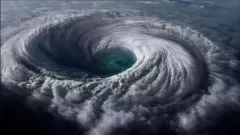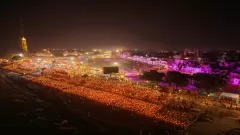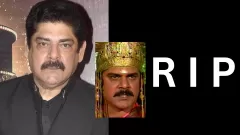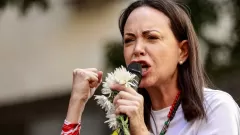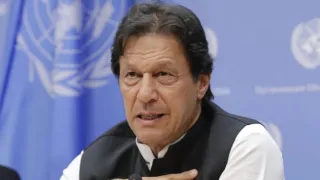Israel Targets Syrian Government Amidst Rising Violence Between Army and Druze Militias
The Israeli military struck Syria’s defence ministry in Damascus on Wednesday for the first time since May, marking the third consecutive day of airstrikes targeting Syrian military positions. The strikes, which reportedly collapsed four floors of the building and devastated its facade, killed one person and injured 18, according to Syrian officials.
Airstrike Aftermath: Ministry Hit Twice
The Israeli Defence Forces (IDF) confirmed the strikes, saying they were a message to Syrian President Ahmed al-Sharaa over the violence in Suweida. The IDF also bombed Syrian tanks on Monday and has carried out dozens of drone strikes over recent days, reportedly killing multiple Syrian soldiers.
Video Footage Emerges of Israeli Strikes
Footage circulating on social media shows the aftermath of the Damascus strike, with smoke billowing from the rubble of the damaged building. Click below to view the video:
Background: Who Are the Druze and What Sparked the Conflict?
The Druze are a religious minority group concentrated in Suweida province in southern Syria. Tensions flared after members of a Bedouin tribe reportedly robbed a Druze man near Damascus, sparking a wave of retaliatory violence. Over 250 people have been killed in four days of fighting, according to the Syrian Observatory for Human Rights (SOHR).
Worsening Sectarian Tensions
- The Syrian army entered Suweida to quell the violence, leading to direct clashes with Druze militias.
- Many Druze have rejected Israel’s claim of acting in their defense, fearing they could be seen as foreign proxies.
- Fears are rising of a broader sectarian conflict, with Sunni-led government forces fighting largely Druze fighters.
Human Rights Abuses Reported
Eyewitness accounts and videos reveal disturbing scenes of abuse. On Tuesday, 16 unarmed civilians were killed inside a reception hall in Suweida, allegedly by armed gunmen. Some were reportedly blocked from receiving medical attention.
Testimonies from Suweida Residents
- Maan Radwan, a London-based Syrian, said he lost nine relatives in the massacre.
- Medical personnel confirmed close-range gunshot wounds on the victims.
- Witnesses reported looting, arson, and sniper fire targeting civilians trying to retrieve bodies.
Government and Military Response
President Ahmed al-Sharaa condemned the killings, stating: “These criminal and illegal actions cannot be accepted under any circumstances.” However, doubts remain about accountability, as militia and military forces appear indistinguishable in many videos.
Social Media and Sectarian Incitement
- Two government force members posted sectarian hate speech online, including a soldier brandishing a machete and mocking Druze spiritual leaders.
- The Syrian Defence Ministry claimed to be “adhering to rules of engagement to protect residents.”
Civilians Trapped, Basic Needs Cut Off
Residents report being locked inside their homes due to gunfire outside. Electricity and water supplies have been cut, and several homes and shops have been torched by armed men yelling sectarian slurs.
Regional Reactions and Israeli Involvement
The violence in Suweida has drawn outrage from the Druze diaspora. Some Israeli Druze crossed into Syria to aid their community but were retrieved by Israeli forces. Prime Minister Benjamin Netanyahu warned citizens not to cross the border, citing risk of death or hostage-taking.
The Israeli military said it had reinforced its presence along the border. Despite recent talks hinting at normalization between Israel and Syria, this week’s events have brought relations to a boiling point.
Past and Present: A Complicated History
Israel has launched hundreds of airstrikes against Syrian military targets since the fall of Bashar al-Assad. The current escalation in Suweida highlights both the fragile nature of Syria’s post-war stability and the deeply rooted sectarian divisions still burning within the country.
A ceasefire was announced Wednesday by the Syrian government and one of the Druze’s three spiritual leaders. However, another leader, Sheikh Hikmat al-Hijri, vowed to continue fighting, calling the regime “armed gangs.”
The previous truce on Tuesday had similarly failed. Whether the current ceasefire will hold remains uncertain amid continued fighting and a rising death toll.




